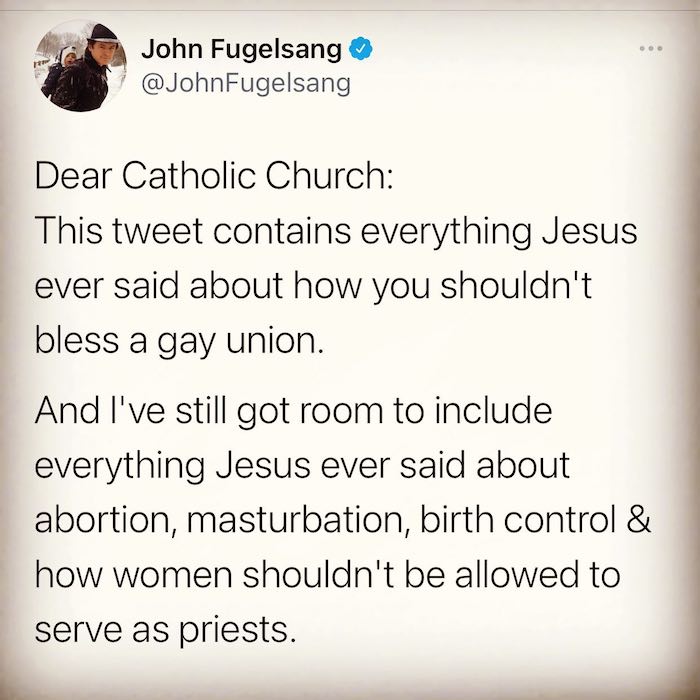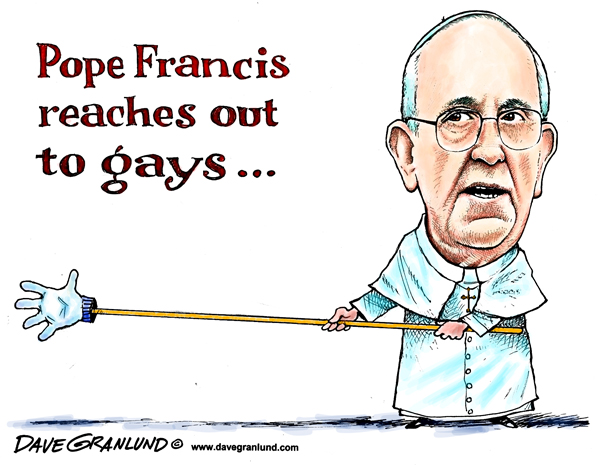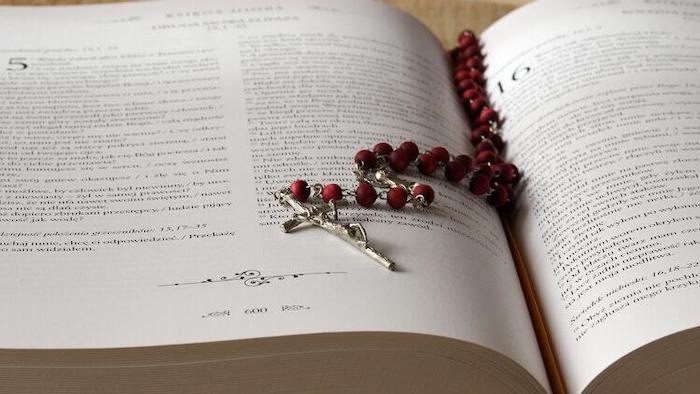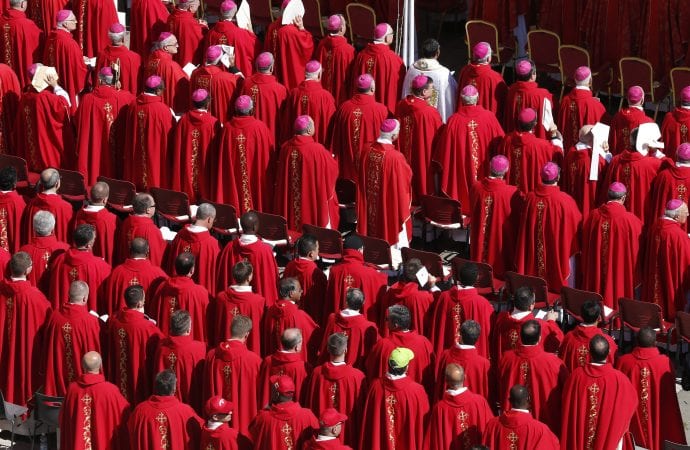
Same-sex marriage exposes ‘cavernous divide’ between Vatican, Catholics

The Vatican’s orthodoxy office has issued a formal response to a question about whether Catholic clergy have the authority to bless same-sex unions, saying the Catholic Church won’t bless same-sex unions since God “cannot bless sin.”
Landon Schnabel, assistant professor of sociology at Cornell University, says while the Vatican’s announcement is in keeping with the views of the church, it does not reflect the opinions of many everyday Catholics.
Schnabel says:
“The Pope’s pronouncement against same-sex marriage is consistent with Catholic tradition, but inconsistent with Catholic public opinion, especially in countries like the United States where about three in four Catholics support same-sex marriage.
“This distinction highlights the ongoing tension between elite pronouncements from institutional religious leaders and what everyday adherents believe, which is present across religions but is particularly pronounced in Catholicism as a diverse and global religion with one set of official rules from on high and yet a wide range of beliefs and practices on the ground. Especially on issues of gender and sexuality, there is often a cavernous divide between what the Vatican says and what everyday Catholics think and do.”
—
Kim Haines-Eitzen, professor of religious studies at Cornell University, says the announcement continues a legacy of conflicts over human sexuality.
Haines-Eitzen says:
“Christianity has been interwoven with debates about gender, sexuality, and the human body from the very beginning. The latest news from the Vatican against blessing same-sex unions continues a historical legacy fraught with conflicts over, in particular, human sexuality.
“From its inception, Christians argued about whether it was better to be married or celibate, whether women could hold positions of ecclesiastical authority, and about rules for sexual relations.
“At stake in this long and troubled history is the paradox of tradition, which is at once conservative and dynamic. Church traditions developed in part through the interpretation of biblical texts, the need for church unity in the face of diversity, and increasingly through the establishment of ecclesiastical law. The decree issued today stands in marked tension with recent efforts toward a more inclusive and expansive Catholicism.”
Catholic group opposes Colorado bill that would give child sex abuse survivors the ability to sue their abuser at any time
Lawmakers looking at two bills on topic, one dealing with statute of limitations and another to hold organizations more accountable

By SAJA HINDI
For decades, survivors of childhood sexual abuse and their advocates have urged states to let them hold abusers accountable in civil court, no matter how long it’s been since the abuse. A bipartisan bill in the Colorado Legislature to do just that so far appears to have widespread approval, but it’s not without opposition from the Colorado Catholic Conference — a church embroiled in a sex abuse scandal in Colorado, the U.S. and around the world.
There is no expiration date in Colorado to bring criminal charges against a person accused of child sex abuse, but the statute of limitations to sue an individual is only six years after a victim turns 18. Last year’s effort to change the latter failed.
The renewed push to eliminate the statute of limitations for lawsuits against alleged child sex abusers saw an unanimous Senate vote this week — a vote Wheat Ridge Democratic Sen. Jessie Danielson called “historic.” But the bipartisan bill, which now heads to a House committee, doesn’t apply to civil claims that will have already expired by the time it takes effect, which was a sticking point over constitutionality concerns last year.
That’s why lawmakers have introduced a second (also bipartisan) bill to create a new cause of action to allow people abused as children to sue public and private institutions like churches, schools and the Boy Scouts for past abuse that occurred under their watch. Both the Colorado Catholic Conference and the Boy Scouts, which is also facing abuse allegations in the state, are opposed.
Republican Rep. Matt Soper of Delta is one of the sponsors on both bills, partly because one statistic about childhood sexual abuse sticks with him: Victims often don’t disclose the abuse until their 50s.
“And usually, it’s not a one-off instance. It’s usually over and over again by a family member, a close family friend, someone who’s in a position of trust like a teacher or a priest or a club leader, or a trainer,” Soper said. “And it takes years and years for that individual to be able just to share their story.”
That was James “Jeb” Barrett’s experience. The child sexual abuse survivor and leader of the Denver Survivors Network of Those Abused By Priests (or SNAP) chapter grew up in Montana, and said he was sexually abused as a child by multiple adults he trusted — a teacher, an uncle, a priest and Scout leader. His partner, who had also been abused as a child, died by suicide.
It took him until he was 63 to talk about his abuse, he said. He’s now 81, and understands firsthand the effects of childhood trauma, including dealing with addiction.
Other times, the adults in a child’s life don’t believe them, furthering that trauma. On the Senate floor Tuesday, Sen. Brittany Pettersen shared the story of her own mother, who was sexually abused at a young age for years by Pettersen’s grandfather. Pettersen’s mom eventually told her mother, who didn’t believe her daughter.
“This bill is about slightly giving back to ensure (adults abused as children) actually feel for the first time in their life they have the justice they’ve been seeking, the acknowledgement they’ve been seeking for their entire life,” the Lakewood Democrat said.
After years of advocating for policies like the two in front of lawmakers, Barrett said he’s hopeful this time.
“It’s incrementally moving toward the openness, accountability and transparency that we need across the board,” and “justice,” he said.
Support and constitutionality concerns
At least one of the new bills has the support of the Victim Policy Institute, which lobbied heavily against it last year. And, as expected, survivors who’ve advocated for legislation in prior years are back this year, “so their story shapes public policy, so what happened to them doesn’t happen to any other child victim in the future,” said Raana Simmons, director of policy for the Colorado Coalition Against Sexual Assault.
If Colorado approves an elimination of the statute of limitations for civil claims, it will join 12 other states and the U.S. territory of Guam, according to Philadelphia-based Child USAdvocacy.
Kathryn Robb, executive director of the agency and a survivor herself, testifies in statehouses across the country. She said the country is starting to understand how long it takes to disclose abuse and the effects of this trauma on children’s brains and behavior.
“This is happening all over the country right now … because as a society, we are recognizing the enormous problem we have with child sexual abuse,” she said.
A prime example of the widespread nature of child sex abuse is the allegations against Catholic priests. A recent Colorado investigation revealed accusations against dozens of priests for allegedly sexually abusing at least 212 children over the past 70 years, and the church paid nearly $7 million to victims.
The Colorado Catholic Conference, which represents the state’s three dioceses — Denver, Colorado Springs and Pueblo — said it has supported unlimited time to seek criminal charges but not, as proposed in the bill, for civil statutes.
In a statement, the group said it supports “reasonable and fair extension of the civil statute of limitations; however, statutes of limitations must have a sensible time limit to ensure due process for all parties involved.”
The Boy Scouts of America also has been dealing with allegations of childhood sexual abuse across the country, with at least 16 Colorado men joining nearly 800 who signed onto a lawsuit in 2019, saying it happened to them when they were scouts. (A Boy Scouts internal investigation found abuse stretching from the 1940s to 2016.)
The Denver Area Council of Boy Scouts of America supports the bill that would eliminate the statute of limitations for civil claims, Scout Executive and CEO Chuck Brasfeild wrote in a statement. But the group is concerned about the other bill — creating a new cause of action against an organization that either knew or should have known about the risks and concealed abuse — which, Brasfeild said, appears to be an unconstitutional overreach.
The Colorado Catholic Conference also opposes that measure, saying: “Passing a bill with constitutional and due process problems does not put victims first. It will only delay opportunities for survivors to receive compensation and not promote true restorative justice. The Catholic Church in Colorado is eager to ensure survivors of abuse receive the support they need for true healing.”
But the bill sponsors say that’s the reason they created the measure — expected to have its first Senate committee hearing next week — so victims can sue abusers and the organizations that protected them regardless of when the abuse happened instead of using what’s referred to as a “lookback window” to revive old claims.
Legislative lawyers said a “lookback window” violates the state’s constitution, according to bill sponsors Commerce City Rep. Dafna Michaelson Jenet and Soper.
“We really wanted to respect our state’s constitution,” Soper said. “Otherwise, why are we here?”
Ted Trimpa, a Colorado lobbyist for the Victim Policy Institute based in Washington, D.C., had argued against the bill last year, saying it didn’t go far enough without the “lookback window.” He believed Colorado lawmakers should have taken the issue to court because other states have successfully won such challenges.
This year, his organization is reviewing whether it will support the civil cause of action bill and is supporting the statute of limitations bill, Trimpa said.
Danielsen said she is urging lawmakers to “think about the adults who endured this kind of abuse in their past because it was traumatic and caused lifelong damage and pain and suffering” — people who have had to seek treatment for years. It will shift the cost from the victims to the abusers as well as prevent young kids from having to face abusers in criminal court, she said. Instead, parents will be able to pursue civil action on their children’s behalf.
Approving this bill, she added, gives lawmakers the opportunity to “stand on the side of survivors and protect those who can’t protect themselves.”
Complete Article ↪HERE↩!
Dissecting the Catholic Church’s Disrespect of LGBTQ+ People
What if the Roman Catholic Church wrote about African-Americans and women the way it still writes about LGBTQ+ people?

Long before I entered the Society of Jesus, the Jesuit religious order of Pope Francis I, I studied American history. It was in those remarkable history courses that I learned about the birth of the United States, from colonies through revolution to the writing of the Constitution and the making of a republic. The birth of the American experiment, the purest democracy protected by federalism, had its warts from nation-building: Chattel slaves were not counted as fully human, their rights impinged upon through forced labor, whipping, or in some cases, death. My African-American brothers and sisters are still overcoming the institution of slavery today.
The Black Lives Matter movement has made tremendous progress on educating Americans and world citizens about the terrible toll exacted on human beings because of the color of their skin. It is the Black Lives Matter Movement that has reclaimed the commemoration of June 19, 1865 — the celebration of the end of slavery, known as Freedom Day.
While I love history and am no longer a Jesuit, I have spent the past six years advocating for the rights of the LGBTQ+ community in the Roman Catholic Church. In my memoir, A Catechism of the Heart: A Jesuit Missioned to the Laity, I write specifically about my departure from the Jesuits because they would not confront the homophobia of the Roman Catholic Church despite the tonal shifts ushered in by Pope Francis. Mostly, mine is a journey book where I invite my readers to consider whether to remain in a church that counts them as less than fully human, a church that cannot celebrate the good works, talents, time, and stewardship of LGBTQ+ people amid its own flock.
Despite my not being a member of the Roman Catholic Church anymore — I am a convert to the Episcopal Church — I am attempting to discard the negative theology of my former church, its antigay theology and rhetoric. I believe the Black Lives Matter movement allows me to confront the homophobia of the Roman Catholic Church in a bold new way. To do this requires analysis of the text of the Catechism of the Catholic Church.
The catechism, or teaching, is the official statement of belief of the Roman Catholic Church. It carries more weight than the words of a single pope or the hopes of the many closeted gay priests who pray that one day these words will be forever removed from the language of the catechism. Why haven’t they been already?
Let’s juxtapose the Catechism of the Catholic Church’s language with homosexuality, along with the language of other marginalized people, like African-Americans and women, and then enter into a discussion about why the Catholic Church should move to rewrite the catechism in light of these objections. (For the full text of the Catechism of the Catholic Church, click here.)
A final observation before I begin, the Catechism of the Catholic Church presents its doctrine of homosexuality (or same-sex attraction) following a review of the moral virtue of chastity. In 2021, a good homosexual in the church must be celibate. The number listed below is the citation for the official statement of belief contained in the catechism.
Homosexuality (#2357)
Original text:
“Homosexuality refers to relations between men or between women who experience an exclusive or predominant sexual attraction toward persons of the same sex. It has taken a great variety of forms through the centuries and in different cultures. Its psychological genesis remains largely unexplained.”
What the text looks like with “homosexual” replaced with “African-American”:
“African-American refers to a people who experience exclusive or predominant sexual attractions toward persons of the same or opposite sex. It has taken a great variety of forms through the centuries and in different cultures. Its psychological genesis remains largely unexplained.”
Same-Sex Attraction (#2358)
Original text:
“The number of men and women who have deep-seated homosexual tendencies is not negligible. This inclination, which is objectively disordered, constitutes for most of them a trial. They must be accepted with respect, compassion, and sensitivity. Every sign of unjust discrimination in their regard should be avoided. These persons are called to fulfill God’s will in their lives and, if they are Christians, to unite to the sacrifice of the Lord’s Cross the difficulties they may encounter from their condition.”
What the text looks like with a focus on African-Americans:
“The number of African-Americans who have deep-seated sexual tendencies is not negligible. This inclination, which is objectively disordered, constitutes for most of them a trial. They must be accepted with respect, compassion, and sensitivity. Every sign of unjust discrimination in their regard should be avoided. These persons are called to fulfill God’s will in their lives, and if they are Christian, to united to the sacrifice of the Lord’s Cross the difficulties they many encounter from their condition.”
Homosexuals and Chastity (#2359)
Original text:
“Homosexual persons are called to chastity. By the virtues of self-mastery that teach them inner freedom, at times by the support of disinterested friendship, by prayer and sacramental grace, they can and should gradually and resolutely approach Christian perfection.”
What this text looks like if “homosexual persons” is replaced with “women”:
“Women are called to chastity. By the virtues of self-mastery that teach them inner freedom, at times by the support of disinterested friendship, by prayer and sacramental grace, they can and should gradually and resolutely approach Christian perfection.”
As a gay man, I find it unholy that the Roman Catholic Church continues to perpetuate, without factoring in scientific research, its myths about homosexuality. It uses the theology of dead saints to negatively label homosexuals as intrinsically disordered. Please note that categories like bisexual, transgender, nonbinary, and genderqueer do not even make it into the Catechism of the Catholic Church.
Furthermore, it is obvious to me that the Roman Catholic Church could not perpetuate myths about African-Americans, women, the disabled, or Latinos.
And while my revisions may seem unconventional or awkward or funny, they underline a truth about the place of gay, lesbians, and bisexuals in the Roman Catholic Church: They are a second-class citizen tolerated but not fully wanted. Good only if celibate. Weren’t African-Americans once valued only as slaves?
If homosexual tendencies are “not a sin,” why does the Catholic Church still discourage homosexual men from entering the priesthood? All priests are supposed to be celibate, regardless of sexual orientation, What should sexuality matter?
About gays in the priesthood, then-Pope Benedict XVI wrote in 2005 that dioceses “cannot admit to the seminary or to holy orders those who practice homosexuality, present deep-seated homosexual tendencies or support the so-called ‘gay culture.’ Such persons, in fact, find themselves in a situation that gravely hinders them from relating correctly to men and women.” In other words, hate the sin, not the sinner!
My friend Lisa McClain, a professor at Boise State University, wrote me recently and asked me, “Does Benedict XVI’s conviction that the alleged inability to relate to men and women mean that the Church doesn’t think gay men can relate to and appropriately counsel people? And how might the Catechism’s description of homosexuality as ‘objectively disordered’ play into this?”
A 1986 Vatican letter states:
“Although the particular inclination of the homosexual person is not a sin, it is a more or less strong tendency ordered toward an intrinsic moral evil; and thus the inclination itself must be seen as an objective disorder.”
Insert “African-American” into that letter:
“Although the particular inclination of the African-American person is not a sin, it is a more or less strong tendency ordered toward an intrinsic moral evil; and thus the inclination itself must be seen as an objective disorder.”
To return to the inspiration for this experiment, the Black Lives Matter movement has allowed for an investigation into complacency and complicit behaviors. If the exercise above has done nothing less, it has shown the futility of the church’s antigay rhetoric and negative theology toward LGBTQ+ people. But why aren’t more LGBTQ+ people challenging this teaching, this catechism, directly?
LGBTQ+ people are human beings, created in the image and likeness of a loving god. Their time, talents, and stewardship should be praised and exalted by the Roman Catholic Church. Gay priests must come out of the closet. For certain, the Catechism of the Catholic Church should excise its outdated, non-scientific language. As the Jesuit priest Father John Kavanagh once taught me in a graduate class at Saint Louis University, all humans count as persons, but for the gay person a caveat remains that if you are still Catholic, you are a person only if you are celibate. If you don’t buy that, it’s time to find a church that wants you with all your humanity, just like Jesus himself: fully accepting, no questions asked.
Complete Article ↪HERE↩!
The curse of clericalism
— The Catholic Church must act now to address the sins of the past

By Michael W. Higgins
In just one week in January, it seemed as if all the grief and shame was unleashed again. Every media outlet was covering one story after another about the Catholic Church and the cumulative effect was dispiriting and demoralizing.
There was the decision by the Supreme Court of Canada, which declined to hear a final appeal from the Archdiocese of St. John’s concerning its liability over the abuse of children at Mount Cashel Orphanage; there was the rising clamour for the resignation of Vincent Nichols, the Cardinal Archbishop of Westminster (the premier Catholic prelate in England), following a report chronicling his failure to deal with abuse cases while Archbishop of Birmingham; there was the final report of the Commission of Investigation into Mother and Baby Homes in Ireland, with its searing indictment of ecclesial neglect and cruelty; and there was the uncontained outrage in Cologne, Germany, over the obstinate refusal of its Cardinal Archbishop, Rainer Maria Woelki, to make public the findings of an investigation he commissioned into abuses in the archdiocese.
So when does it end? When will the toxin that is clericalism – the corrosive pattern of entitlement and abuse of power by clergy – be purged? How does the institutional church move on when it cannot stanch the flow of allegations? Certainly the contributing factors are many – and some are outside the immediate boundaries of church life. But what progress can be made if there is still resistance to full disclosure, to acknowledging the sins of the past in a manner that is genuinely contrite and not choreographed by lawyers and actuaries, when many officials, fatigued and defensive, simply want to escape the relentless pull of accountability?
By means of various studies, surveys, commissions and academic panels, we have a good if not comprehensive understanding of the roots of many of the problems we consider to be the marks of clericalism: the absence of psycho-sexual maturity, truncated emotional growth, the perks of prestige (at least among some in the Catholic community), power and entitlement by virtue of one’s “calling.” It can be reasonably said that we have a handle on the diagnosis. It is the prognosis that concerns many – not least of whom is that ardent advocate for structural change, Nuala Kenny.
A Sister of Charity of Halifax, retired pediatrician and ethicist, Dr. Kenny is tenacious in summoning Catholic authority to the task for reform. In her forthcoming book, The Post-Pandemic Church: Prophetic Possibilities, she highlights her anguished puzzlement that “in a church with a strong commitment to life, the sexual abuse of children and youth is not considered a pro-life issue.” She recognizes that the church’s ill health and slow response to the challenge is attributable to many factors both external and internal. But the persisting pathology compromises the church’s essential purpose, weakening its credibility, souring Catholics on their spiritual birthright – a true sign of enduring scandal.
To reclaim trust, to build anew confidence in the integrity of the church’s leaders – from local pastors to bishops – channels of communication are essential with theologically literate laypeople and a creative rethinking of the way we educate men to priestly ministry is fundamental. And in doing this, we need to de-emphasize, if not eliminate entirely, the spurious and seemingly ineradicable notion that somehow – ontologically – priests are a different species. We need also to take seriously the theological and historical arguments for the ordination of women to the ministry of deacon.
Some of these matters fall within the jurisdiction of the local bishops, some other matters are reserved to Rome, but what is critical at this juncture is action, not paralysis – not waiting out this pontificate in the hopes that the next pope will restore the old identity and calm the tempestuous waters that beset Peter’s barque. Nostalgia and fantasy have no place in a reform agenda. Or, indeed, with reality.
Dr. Kenny’s moral urgency is underscored by the following passage from the late spiritual writer and Irish priest Daniel O’Leary, who spoke of clericalism shortly before his death in 2019 as “a collective malaise … It keeps vibrant life at bay; it quarantines us for life from the personal and communal expression of healing relationships, and the lovely grace of the tenderness which Pope Francis is trying to restore to the hearts of all God’s people.”
The curse of clericalism – a phrase employed by bishops and popes alike – can only really be extirpated when there is institutional will to do so. Dr. Kenny is wondering why we are still waiting. So am I.
Complete Article ↪HERE↩!
